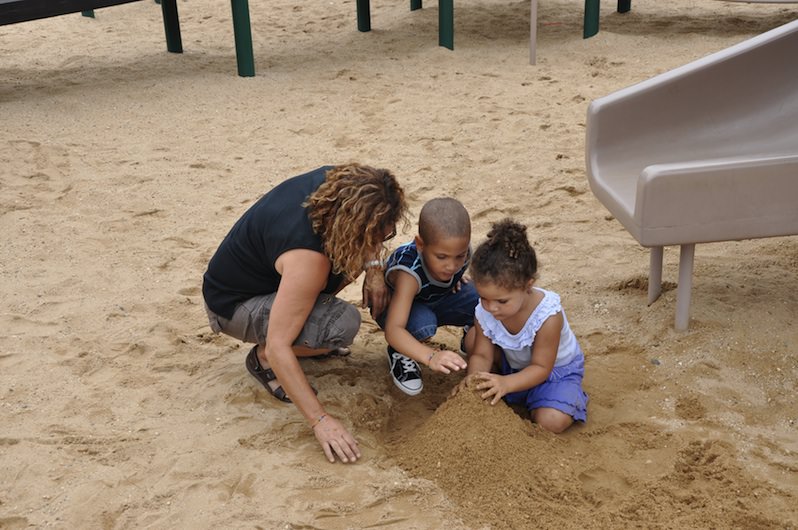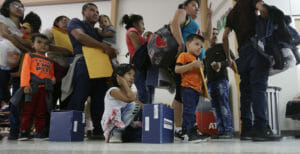The Politics of Parenting: How Our Society Criminalizes Poor Mothers of Color
When 46-year-old Debra Harrell was arrested July 1 for leaving her daughter unattended at a public park, she joined the ever-increasing ranks of poor mothers of color who are criminalized. Shutterstock
Shutterstock
When 46-year-old Debra Harrell was arrested July 1 for leaving her daughter unattended at a public park, she joined the ever-increasing ranks of poor mothers of color who are criminalized. Harrell, who is African-American, and whose full-time job at a South Carolina McDonald’s meant that she couldn’t watch her own child, or have enough money to afford child care, was jailed and separated from her 9-year-old child for some time.
Harrell has since been released from jail and reunited with her daughter. Harrell’s lawyer says his client was fired without specified reasons from McDonald’s last week; the company says it did not fire her. Nonetheless, Harrell’s case represents the increasingly barbaric terrain that lies at the intersections of gender-, race- and class-based prejudice.
Earlier this year, a 35-year-old African-American mother in Arizona named Shanisha Taylor was arrested for leaving her two young children in a car unattended with the windows cracked open while she went for a job interview. A homeless mother who had no child care options, she decided, perhaps unwisely, that getting a job to financially support her child was worth the small risk. She is now being charged with two counts of child abuse, is separated from her children and has likely lost any chance at employment or housing.
A third example is 22-year-old Thelma Louise Edwards, also an African-American mother who was recently incarcerated for leaving her 4-year-old in a car while she worked at a New York TGI Fridays. As this columnist explained, Edwards’ brother, who normally watched the 4-year-old boy, dropped him off unexpectedly one day outside her workplace and when she went to the car, the child was asleep. Edwards, who like most working poor parents, has two jobs and did not want to risk losing one of them. So when her manager asked her to work late, she felt obliged and left her son sleeping for a bit on his own. She now faces the prospect of never seeing her son again.
As a society we actively suppress wages, cut child care subsidies, insist that poor parents work, require that they comply with a complex legal maze of caring for their children by any means possible, and then imprison them and separate them from their children when they cannot make the impossible possible. And it is women more often than men, poor people more often than rich, and black and brown parents more often than white ones who are held to these harsh standards.
Take the case of a white woman named Kim Brooks, who explained in a Salon article how she, in a rush, left her son in a car on a cool day while she stepped into a store for just minutes. A passer-by surreptitiously took a video and turned her in. With the ability to hire a lawyer, Brooks was able to defend herself against charges and walked away with a requirement to do community service and take parenting classes. Even though her experience was harrowing, she did not face jail time or the prospect of her child being taken away from her. Her class, and likely her race, privilege protected her from the same fates as Harrell, Taylor and Edwards.
Another white mother, Lenore Skenazy, a blogger and author of the book “Free-Range Kids: How to Raise Safe, Self-Reliant Children (Without Going Nuts with Worry),” attracted plenty of criticism some years ago, including the epithet of “World’s Worst Mom,” for her decision to let her 9-year-old son ride the New York subway on his own. Skenazy has certainly not faced criminal charges or the potential separation from her child. She asserts that today’s society is obsessed with the constant dangers we imagine children face and that we need to allow kids much more independence for their sakes and ours. The problem with this idea is that when poor mothers or mothers of color consciously or unconsciously adopt the idea of “free-range kids,” they are more likely to be viewed as unfit, neglectful mothers and face the very real likelihood of being separated from their children. I spoke recently with Michele Goodwin, founder of the Institute for Global Child Advocacy and the president of the U.S. chapter of Defense for Children International. She is also a professor at UC Irvine School of Law. In an interview on Uprising, she told me, “The wealthier you are, and being white in the United States and abroad, provides certain kinds of luxuries, and those luxuries we see rolling out every year in some new how-to book in terms of parenting.” Still, Goodwin agreed with the principle that Skenazy promotes about how “children have been overly structured in the United States. Everything is programmed for them and what this leads to is children not being able to necessarily make healthy decisions … and [being] less equipped to be able to be independent and on their own than they would have been a generation ago.
“On the other hand,” Goodwin said, “there are some very harsh penalties that a poor child who is living in a home with a mother of color might be subjected to. There are [also] two very different realities for wealthy women who parent versus those who are poor.”
Today, alongside the stagnation of wages, subsidies to child care costs have also been precipitously falling. As this report by the National Women’s Law Center found, “total federal funding for child care assistance has declined since 2001.” (Imagine Congress or the White House choosing to underfund the military or reducing subsidies to the oil industry!) Many states have also made it harder for poor families to be eligible to receive child care assistance, and of those who are eligible, a significant number face waiting lists.
Goodwin reflected, “Let’s remember that part of the rhetoric on good motherhood and bad motherhood has also had a value judgment laid on it, that says that a mother is only accountable, responsible and respectful when she is working.” Yet Harrell, who was a full-time working mother, could not afford summertime child care on her $8-an-hour McDonald’s salary. “What are working parents to do?” Goodwin asked.
It is not just poor and working-class parents who face the conundrum of unaffordable child care. As a middle-class parent in a two-income household, the $1,200 a month that my husband and I shell out for a modest day care for our 1-year-old barely allows us to make ends meet financially. Certainly I want my son’s caregiver to be well paid, so the only option that remains is government subsidy, which is nonexistent for our income level. Goodwin cited an example in which her colleagues, a law professor married to a doctor, realized they could not afford to have children because child care was too expensive. She told me, “If law professors married to physicians cannot afford child care, then what are we saying to poor women? They are virtually left with no option, and we claim that it is socialist or communist to somehow think about how to take care of our kids.”
Wealthy families do not have to worry about being able to afford child care or being criminalized for leaving their children unattended because they can afford constant professional supervision. Goodwin pointed out that, ironically, “Women of color continue to be used as a primary or certainly significant caregivers for very wealthy white families around the world.”
Although the cases of Harrell, Taylor and Edwards have all generated widespread outrage and even crowdfunding campaigns to pay for their legal costs, not enough is being said or done to address the real gender, race and class disparities in today’s criminalization of mothers.
“All of this is barbaric and we need to rethink this entire system of what it is we are doing to these women,” Goodwin said. The only way in which the barbarism of our current system can be changed is if we fix the structural and societal shortcomings with respect to gender, race and class in our views on parenting. To do that, we must not only raise the minimum wage and increase child care subsidies for poor, working- and middle-class families, but we must also address racial disparities in our criminal justice system.
Your support matters…Independent journalism is under threat and overshadowed by heavily funded mainstream media.
You can help level the playing field. Become a member.
Your tax-deductible contribution keeps us digging beneath the headlines to give you thought-provoking, investigative reporting and analysis that unearths what's really happening- without compromise.
Give today to support our courageous, independent journalists.







You need to be a supporter to comment.
There are currently no responses to this article.
Be the first to respond.